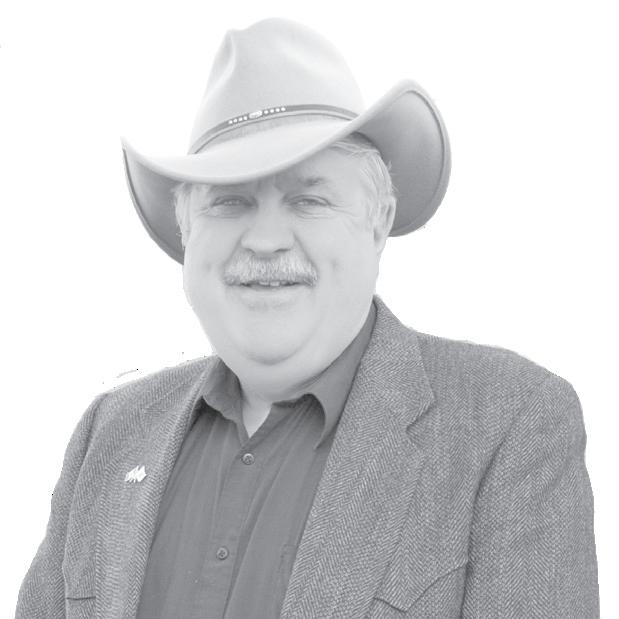
4 minute read
Right in the Centre Ken Waddell
from July 14, 2023
a family member visiting a sick and dying person would spread C-19. The visitation rules were insane, stupidly applied and at the very worst, cruel.
What clearly happened is that rules were made by people with little or no knowledge of reality. It was like a lot of other issues in running a country or society. The farther away from the community reality a decision is made, the worse the decision you get. Some people were running scared and combined with not actually thinking it through and not being on the front lines made for bad policy decisions. I believe that while vaccines may well have saved a lot of lives, the visitation rules may well have killed a lot of people too.
Advertisement
Let me give a totally unrelated example that has some application to decision making. During WWI, the Allied armies were still using cavalry horse mounted divisions. My understanding of cavalry warfare is that it was obsolete by the time of WWI but that message didn’t get through to the British generals. A cavalry charge was an awesome thing when the mounted soldiers were carrying pistols, wielding swords and running up against ground troops who had single shot rifles that were slow to re-load. By the time of WWI, the ground troops were well dug in and had machine guns, backed up by artillery. One day, the British gener- als decided that that the Canadian Cavalry should charge the German trenches. Needless to say, they were cut to pieces with huge losses of men and horses. A few days later, the British generals decided they should try it again because, “They will never suspect we would try it again.” The Canadian commander, who had lost many men and horses said, “That’s a great idea sir, but this time, we will use British troops.” Needless to say the plan was called off. The moral of that story is decisions are best made by those most closely affected by the decision. In the C-19 situation, visitation decisions were being made by people who didn’t have to deal wit the unfavourable results.
Just like in WWI, decisions are best made in any situation by those most affected by the decision. That’s why Neepawa decisions should be made in Neepawa, Rivers decisions in Rivers and you can fit any other community name you want into that statement.
C-19 decision making drifted far away from those most affected by the decisions and we must make sure that never happens again.
Disclaimer: The views expressed in this column are the writer’s personal views and are not to be taken as being the view of the Banner & Press staff.
Re-reading ‘The Winter Years’ by James H Gray there is a sentence that I have read several times before, and this time I needed to stop and think about it. The setting is Winnipeg, the time is the 1930’s, tough economic times. The chapter titles are telling: ‘Our world stopped and we got off; Fun was where you found it; Landladies and a want-ad husband; Tuxedoes were for ditch digging; –and the one that stopped me– Into the wonderful world of bookworms.’
The author, his wife and young child, are struggling with housing, with ration coupons for clothing and food, and trying to adjust from being gainfully employed up and coming, to abject poverty. Gray contracts tuberculosis and how as it is impossible to cure at home with good food, quiet and fresh air, reluctantly consents to staying in the sanatorium. Here he meets a fellow patient– ‘Timchuk was a hollow-eyed, all skin-and-bones North End Ukrainian for whom time had almost run out.’Timchuk teaches him the value of down time, even if there may be no tomorrow. His voracious reading has made him knowledgeable of almost every subject, and the staff had long given up trying to enforce rest periods or early bedtime– Timchuk read!
The opening sentences are [In the life of just about every living thing, there comes a time for a second look, and a momentary halt is called in the struggle with environment. It happens with colts being halter-broken after the third or fourth leap for liberty. It happened to most the unemployed two or three months after going on relief, when they stopped fighting the idea and began to learn how best to live with totally altered circumstances.] When Gray came to this point he decided to use his time to study and learn, to read as much as possible. It took a while to find the type of books that he would find helpful–the most popular book in the Winnipeg Public Library was History and Power of Mind, by Robert Ingalese, a California occultist– think your way to success.
Many of us have come to the point where our life merited a second look, some of us more than once! That point of introspection, for me, has at times lead to dramatic changes with long lasting results. I was not long into my first marriage when I determined that I had not been created to be a human punching bag, and the only change would come with my breaking away, and starting over. I stopped struggling with the concept that I was deserving of such treatment, and I stopped struggling with the hope of a change in the situation. There have been times when the pause to re-evaluate and re-examine a situation has caused me to hunker down and suck it up! No life safety or security at stake in those decisions– usually a touch of pride!
There comes a time when one does stop fighting an idea and begins to learn how to best live with totally altered circumstances. Aging for example. I will never be young again, I can remain young at heart and graciously adapt to limitations. I can… but will I???









